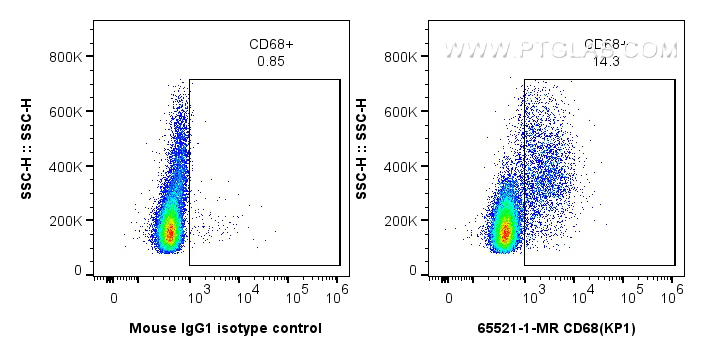验证数据展示
经过测试的应用
| Positive FC (Intra) detected in | human PBMCs |
| Positive FC detected in | human PBMCs |
推荐稀释比
| 应用 | 推荐稀释比 |
|---|---|
| This reagent has been tested for flow cytometric analysis. It is recommended that this reagent should be titrated in each testing system to obtain optimal results. | |
| Sample-dependent, Check data in validation data gallery. | |
产品信息
65521-1-MR targets CD68 in FC, FC (Intra) applications and shows reactivity with human samples.
| 经测试应用 | FC, FC (Intra) Application Description |
| 经测试反应性 | human |
| 免疫原 | Lysosomal fraction of human alveolar macrophages 种属同源性预测 |
| 宿主/亚型 | Mouse / IgG1 |
| 抗体类别 | Recombinant |
| 产品类型 | Antibody |
| 全称 | CD68 molecule |
| 别名 | SCARD1, Macrosialin, KP1, GP110, CD68 molecule |
| 计算分子量 | 37 kDa |
| GenBank蛋白编号 | BC015557 |
| 基因名称 | CD68 |
| Gene ID (NCBI) | 968 |
| RRID | AB_3670307 |
| 偶联类型 | Unconjugated |
| 形式 | Liquid |
| 纯化方式 | Affinity purification |
| UNIPROT ID | P34810 |
| 储存缓冲液 | PBS with 0.09% sodium azide , pH 7.3 |
| 储存条件 | Store at 2-8°C. Stable for one year after shipment. |
背景介绍
CD68 is a type I transmembrane glycoprotein that is highly expressed by human monocytes and tissue macrophages. It belongs to the lysosomal/endosomal-associated membrane glycoprotein (LAMP) family and primarily localizes to lysosomes and endosomes with a smaller fraction circulating to the cell surface. CD68 is also a member of the scavenger receptor family. It may play a role in phagocytic activities of tissue macrophages.
实验方案
| Product Specific Protocols | |
|---|---|
| FC protocol for CD68 antibody 65521-1-MR | Download protocol |
| Standard Protocols | |
|---|---|
| Click here to view our Standard Protocols |
